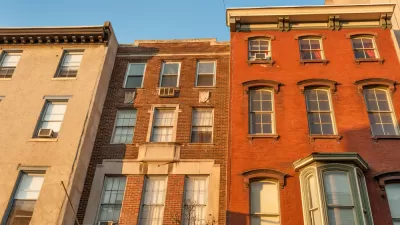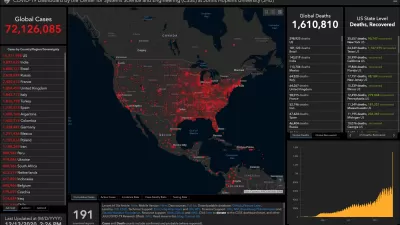Questions about how highly contested questions about the future of the built environment will reference COVID-19 for years to come. The question about whether that debate will achieve any actual change is still very much up for debate.

Planetizen has been tracking the debate about a key intersection between the public health concerns of the COVID-19 pandemic with the concerns of urban planning in the 21st century throughout the ongoing crisis, noting especially the debate surrounding the future of density as a desirable planning outcomes if density proves to be one of the contributing factors for the spread of the novel coronavirus.
After gathering an initial collection of articles on the subject back in March, and continuing to track numerous other manifestations of the debate along the way at the "Coronavirus and Density" tag on the site, there is enough fodder out there on the Internet now for another larger collection of stories to share.
This abundance of think pieces, opinions, and news coverage tends to focus on one of two questions, or both: 1) Did density exacerbate the spread of the coronavirus? and 2) Will anyone want to live in dense cities when the crisis is over?
- The Geography of Coronavirus (CityLab, April 3)
- Op-Ed: Dear Gov. Cuomo, The Problem Is Crowding, Not ‘Density’! (Streetsblog NYC, April 6)
- Will the coronavirus pandemic empty the cities? (Yahoo News, April 16)
- We shouldn’t let this disaster go to waste (Urban Edge, April 16)
- How Fear of Cities Can Blind Us From Solutions to COVID-19 (Next City, April 16)
- COVID-19 puts urban density to the test (Globe and Mail, April 17)
- Urban Density: Confronting the Distance Between Desire and Disparity (Azure, April 17)
- Is Covid-19 the end of cities? (Spoiler: No.) (City Observatory, April 20)
- Urban Density Is Not an Enemy in the Coronavirus Fight: Evidence from China (World Bank Blogs, April 20)
- Don’t blame dense cities for the spread of coronavirus (Curbed, April 22)
- L.A. housing stricken by overcrowding triggers fears of coronavirus spread (Los Angeles Times, April 22)
- Density Has Saved Lives in New York City — and Can Do So Again (CityLab, April 24)
- Building dense cities was California’s cure for the housing crisis. Then came coronavirus (Los Angeles Times, April 26)
- Op-Ed: Angelenos like their single-family sprawl. The coronavirus proves them right (Los Angeles Times, April 26)
The stakes in the debate are high, and political biases flavor every talking point. Anti-density political forces (along with many casual observers) have quickly embraced a narrative about density worsening the spread of coronavirus to mobilize new political and economic power to reprioritize suburban development. Ardent urban dwellers are clearly concerned about the loss of the bustle of their way of life. Many millions of Americans might still reconsider their assumptions about communities. Meanwhile, many prominent figures use the term density interchangeably with the term crowding, further muddling the substance of the conversation. Tens of thousands of lives have been lost, and the living deserve to know with as much scientific certainty as possible about the risks inherent with how we live and work.
For over a century, the field of planning has labored to balance competing visions for a future world that protects and improves the health and prosperity of as many people as possible. Whether unintentionally or intentionally, the field of planning hasn't always lived up to the challenge. The planning status quo is partly responsible for the pandemic's tendency to harm low-income and people of color in far greater proportion than the general population, as well as an economy on the brink of collapse and an environment that will continue to collapse without make massive, systematic changes to how it lives and works. People who are struggling to make ends meet in a hobbled economy will require affordable housing options and efficient, affordable modes of transportation. Tough choices lie in front of the powers that drive planning policy in the United States (politicians, planners, and, yes, the public), about which lessons to learn from this pandemic, and how the built environment will evolve. Which will it be?

Planetizen Federal Action Tracker
A weekly monitor of how Trump’s orders and actions are impacting planners and planning in America.

Vehicle-related Deaths Drop 29% in Richmond, VA
The seventh year of the city's Vision Zero strategy also cut the number of people killed in alcohol-related crashes by half.

As Trump Phases Out FEMA, Is It Time to Flee the Floodplains?
With less federal funding available for disaster relief efforts, the need to relocate at-risk communities is more urgent than ever.

Berkeley Approves ‘Middle Housing’ Ordinance
The city that invented single-family zoning is finally reckoning with its history of exclusion.

SEPTA Budget Slashes Service by 45 Percent
The Philadelphia-area transit agency is legally tasked with maintaining a balanced budget. Officials hope the state will come to the rescue with additional funding.

Connecticut Governor Vetoes Housing Bill
Gov. Lamont reversed his view on a controversial affordable housing bill that would have required municipalities to zone for set amounts of affordable housing to receive state funding.
Urban Design for Planners 1: Software Tools
This six-course series explores essential urban design concepts using open source software and equips planners with the tools they need to participate fully in the urban design process.
Planning for Universal Design
Learn the tools for implementing Universal Design in planning regulations.
Heyer Gruel & Associates PA
JM Goldson LLC
Custer County Colorado
City of Camden Redevelopment Agency
City of Astoria
Transportation Research & Education Center (TREC) at Portland State University
Camden Redevelopment Agency
City of Claremont
Municipality of Princeton (NJ)






























